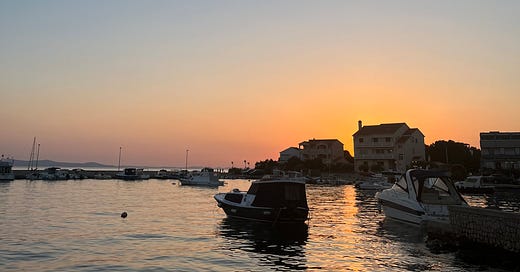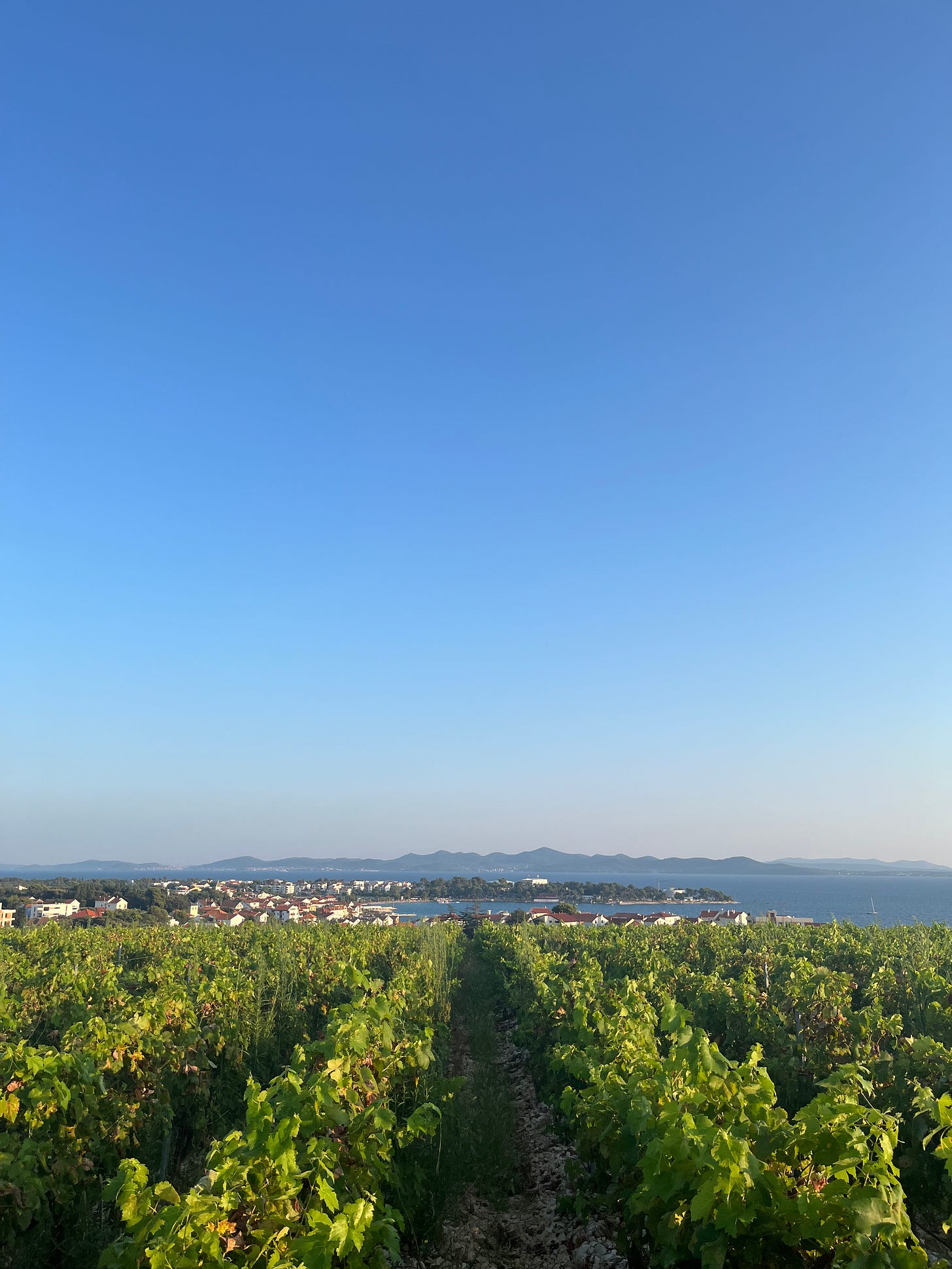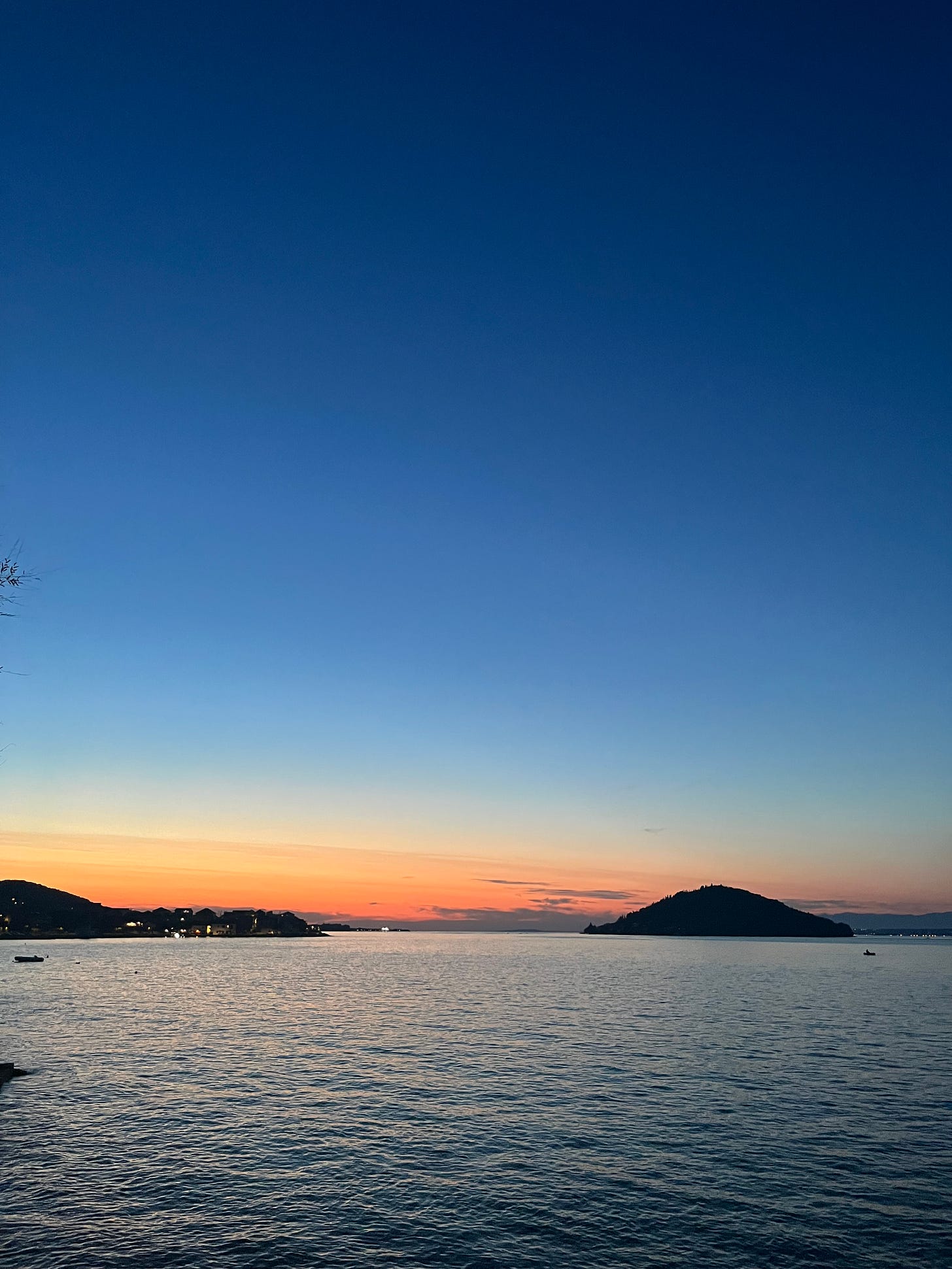At around 7am I peeled myself out of bed after a sticky night’s sleep. I walked downstairs to get my bearings, grabbed the coffee machine from the basement, and set my laptop up outside. The cicadas are almost overwhelming; they have so much to say. They don’t recognise my foreign body.
A few minutes go by and I join them, coffee in hand, the sun beating against my forehead. My eyes still sting from putting in my contact lenses a few minutes ago. I felt an immediate urge to get up as early as possible this morning to prepare - to stock the fridge, check the sheets, lay the table, open the wine - for the gradual arrival my family, first mother then brother and sister-in-law, to Petrčane.
I resented Petrčane when I was a kid. It was alien to me, as alien as any neighbouring town could feel from your own. My boyfriend and I arrived a few hours earlier and I felt in a haze, not from having pints to wait out our delayed flight, but unaware of the reality of visiting Petrčane for longer than a few days. For years I told myself that I was from Poljana on the island Ugljan, obsessed with the idea of being an ‘islander’ with the majority of my family being from there, a fake one at that, often sat frozen or bored next to my parents, afraid to event attempt to articulate myself in my tongue, a discomfort that has lived with me through my years. Poljana was everything in my eyes, discounting the other village where my family is from.
Petrčane was something I knew only in brief encounters, day trips and weekends away to visit my Dido, faint memories of being a toddler waddling around my great-grandparents house, their grandiose staircase, sitting in my Dido Šime’s favourite plastic green chair often nestled into the corner of the balcony. I remember him laying down on the sofa to be eye-level and my brother and I feeding him soup, my Baba Nada shouting about something but getting quieter as the years gone on, dressed impeccably, not a hair out of place, dying it jet black until the last years of her life. I’ve noticed that my hair, too, has started to sparkle, more than it has in previous years. Grey hairs of all shapes and sizes, some blunt and short, some squiggly and long, some in tiny patches, sprinkle across my hair. Even in cutting my hair short, ultimately a preference but maybe even a hyper-fixation, I see them sticking out when I leave my hair wet, staring back at me in the mirror. In my lineage of women, I wonder what my next step is.
Baba Bložo and Dido Mario’s house was always a treasure trove, from what I can remember, the small yet insurmountable apartment in Astoria, Queens that housed me and my brother on weekends. There was always something to marvel at - porcelain coffee tables with engraved cherrywood legs I laid my VHS tapes on, a butter yellow corded phone I always wrapped my fingers around, ceramic pieces of fruit that hung along the walls of the kitchen I prayed I would inherit. This apartment saw so many things, the Thanksgiving where I deemed gravy revolutionary, then refused to eat it after my Baba couldn’t cook anymore, shredding apple to make frite and picking out bits of raisin, my brother and I singing at the top of our lungs and staying up past our bedtime to watch Charlie and the Chocolate Factory, random friends and probably relatives appearing at the door seeming giant to my 8 year old self, the introduction of a nurse called Yula and hospital bed when my Baba had a stroke.
When my Baba passed, my Dido moved back to Croatia and built the house in Petrčane from a patch of land that sits directly below the vinograd, the vineyard that seems to go on for miles but sits peacefully between the sea and the mountains. In moments of haze, like this very morning, I think about the Croatian’s favourite pasttime: arguing about property, how a few years back if my dad were to die the three of us - my mom, brother and I - would each get a third of his house. If she were to die, he would get the whole thing, or that’s how it was once told to me, I think, in some convoluted, drunken fashion. I don’t think about this much anymore, or maybe I do, but more so in the context that I want my partner and children and the family I hold within my friendships to feel at home within the places that have seen me to the present moment.
In our first visits to Petrčane the house felt like a museum, a collection of past objects transported from Astoria to a seaside village with olive trees. The ceramic fruits from my baba’s kitchen now decorated the walls of a larger house, spread out like distant freckles only appearing from a brief stint in the sun, the fridge filled with the bare essentials - meats, cheeses, wine, sometimes tomatoes. At the time I didn’t know how to feel about it, being away from the island, even for a day or so. In breaks between swimming and running I found myself digging through drawers wondering what I would find, sifting through receipts and lists with handwriting I could barely make sense of, sometimes old carpentry measurements, others bills and documents both old and new. The notebooks and toys I brought on my first visit patiently waited in my room for my next one, and the one after that.
As I sip my coffee, I look at the new building has cropped up across the street from the house, and then to the sea. In the car on the way from the airport, my neighbour told me that it was built in 3 months, its skeleton unearthing itself like a flower in bloom. It feels monumental, the crane next to the house that shifts slowly in direction, now pointing towards the vinograd, unsure of what will happen next.
After putting fresh towels in the bathroom, I sat on the balcony where my mom’s room is and saw abstract houses in the distance, a pink triangular house sandwiched between multicolour pops of blues and greens, oblique windows with flowers pouring out. For years I have dreamed of the houses here but have reserved the reality of where to live for the island, the purple house in Kali, the big pink house in the center of Poljana’s marina. I wonder how I never noticed this, never in our years of visiting.
In Maya Jasanoff’s New Yorker piece “Our Obsession with Ancestry Has Some Twisted Routes” she articulates ancestry as having an instrumental power over us in the narrative we tell ourselves, mine having been a self-diagnosed case of ‘island psychosis’, a story I tell myself about the place that I am from, though not encapsulating the variety of place and space and shape that comes from my identity. Poljana was everything when I was a kid. After uttering its name for the first time, I told myself it was my destiny, in a way, glued to the procession from plane to plane to ferry to car to make our pilgrammage down to our family’s quarters, the corners of Poljana laced with the surnames of my family. The lore was understandable. Poljana saw some of my first Croatian friends, scale exercises taped to the walls and the rebirth of someone I once knew, a girl who would write short stories called “Jenny and Friends” in her bedroom, the strolls along the coast I’ve taken with the writer I now seem to call myself. Identity is significant, by any means. In Croatian, your village is your way of interpreting the world, for better or worse, creating even the smallest distinction in how you speak - anyone can tell what village you are from just by the way you say ć vs č, if kuća sounds more like kuča. But in really looking at my relationship to it, to its place in the island of Ugljan, Poljana’s hold on me is no longer the insurmountable weight that it once was.
My stomach churned for weeks before coming here at the very thought of going to Poljana but it still felt like the most important thing to me, to show my boyfriend the place that made me who I am. Nevertheless, I got us on the ferry to go doli, passing the time with word games and crosswords. I shakily held his hand as we disembarked and talked, pointed, sharing anecdotes from the streets I had spent years walking and running down, pockets of the coast where I tucked myself into to read along the water, the cafe where I drank kavu s šlag and began to write about the idea of home. When I let go to rub my eyes from the blazing sun, Poljana faded into a dream I once had, a love story gone wrong, covered in hives, with sparkles of the things I still love, swimming at Jaz, ice cream at Plavi Jadran, dozing off on the ferry back to the mainland.
When I am asked (almost daily) where I am from, I tend to say that I grew up in New York, but my family is from Croatia. I deliver an over-rehearsed speech that sits crumpled in my pocket, singing the praises of the island. As I wipe my hands to dig it it out this time, I see an addendum has been added, a series of folktales that encompass what being from somewhere is - the olive trees shared between properties, the bits of sea we swam through, the meals we cooked while laughing hysterically, the friends and relatives in Preko and Diklo and Privlaka and Kali and Kožino for generations to come, the welcoming of being both Poljanci and Petrčanci.







Beautiful ❤️